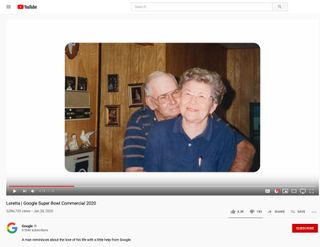Google makes the saddest Super Bowl ad in history

What you need to know
- Google is previewing a Super Bowl ad on YouTube.
- The ad shows photos of an older couple as a man asks Google to remember things about his wife.
- The Mayo Clinic suggests using photos and mementos as cues to help Alzheimer's patients.
If you're like me and living with older parents who are dealing with memory issues and other signs of aging, grab a box of tissues and get your therapist on speed dial before you start watching Google's new Super Bowl advertisement. The ad starts with a simple text box search for "how to not forget," then an older male voice asks Google to "Show me photos of me and Loretta." What follows is a montage of an older couple in love while a man's voice speaks about Loretta in the past tense.
Google opens the ad by pointing to articles from WikiHow and Bustle about using details to help with memory loss, and the Mayo Clinic agrees. On its page for using mementos as memory cues, the Mayo Clinic suggests:
- Keep an electronic or online folder with photos and mementos from your loved one's life
- Write down descriptions of important events
- Create a scrapbook or special box with photos, newspaper clippings, letters, postcards, greeting cards, sketches, poetry and musical verses
- Make a video or audio recording of personal stories
The Google ad touches on all of these tactics, and offers a few suggestions in the supporting YouTube video description for how to engage the features shown. For instance, you can ask Google to remember certain facts, like "Remember, Loretta hated my mustache." Then later you can ask Google "what did I tell you to remember" and Google will recite your facts. Google also suggests tagging names and events in advance so that they will be easier to find in search later. Alzheimer's is the sixth leading cause of death in the United States, but may be the third highest among older people.
Read more about Alzheimer's disease at the Mayo Clinic
Be an expert in 5 minutes
Get the latest news from Android Central, your trusted companion in the world of Android

